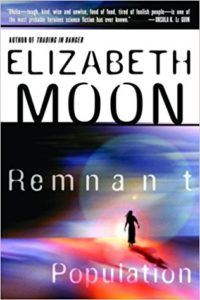 This ‘first contact’ story is unusual because the protagonist is a cranky old lady on a remote Earthlike colony, and because the aliens do not ‘arrive’ in the traditional sense – they lived there the whole time, but, improbably, went unnoticed for forty years. When the colony is disbanded and everyone is shipped out, Ofelia hides in the forest to miss her ride so she can finally be alone and die in peace. She tends her garden and enjoys her own company.
This ‘first contact’ story is unusual because the protagonist is a cranky old lady on a remote Earthlike colony, and because the aliens do not ‘arrive’ in the traditional sense – they lived there the whole time, but, improbably, went unnoticed for forty years. When the colony is disbanded and everyone is shipped out, Ofelia hides in the forest to miss her ride so she can finally be alone and die in peace. She tends her garden and enjoys her own company.
The natives then make themselves known. They aren’t described well and I could never form a mental image, but they seemed to be something like a cross between a sasquatch and a lizard. They’re bipedal, with yellow eyes, covered in fur, I think, and have an expressive air sac under the chin like a frog.
Despite no common language, Ofelia manages to communicate with them, treating them as she once did her young children. She is fearful at first but soon she is ‘adopted’ by the aliens, who call themselves, ‘the People.’
The human government returns to inspect the abandoned colony and are surprised to find Ofelia and the People there. They assume, as military people would, that Ofelia is stupid and the People are subhuman. They become enlightened and go away and everything is fine.
And that’s the trouble with the story. There really is little dramatic tension. Ofelia’s dominant interests and activities are gardening, cooking, sewing, and going to the bathroom. The People are interesting if vague, but never dangerous. The military expedition is populated by cartoony characters with stereotypical motivation, thick-headedness, and arrogance.
Ofelia goes through a mild character arc, from wanting to be alone, to accepting her responsibility as spokesperson for the People, but she has no great epiphany.
The attractions of the novel are the unusual protagonist, the cute aliens, especially their young ones, and the playful way all of them interact with Ofelia. A strong linguistic element is displayed (which is why I picked up the book) as Ofelia learns to communicate with them, although no linguistic principles or insights are examined, so that was a disappointment. Basically, Ofelia uses gestures, demonstrations, and mimicry to teach and learn the communal pidgin they develop. It’s a sentimental story, and the aliens are not very alien, and there is no serious antagonist (the military is a generic threat), and not much drama. It’s an anodyne tale that will go down easily with young people or those who don’t normally read sci-fi.
Author Moon raised an autistic child and perhaps that influenced her story. Even though the aliens are just substitutes for vulnerable children, the story does raise important ‘first-contact’ issues for humans, such as how to communicate, what to assume about the other, how much to influence another culture. The story is mainly about Ofelia however, a simple person who stands for the best of humanity, and as such the novel counts as psi-fi.
Moon, Elizabeth (1996). Remnant Population. New York: Ballantine, 325 pp.